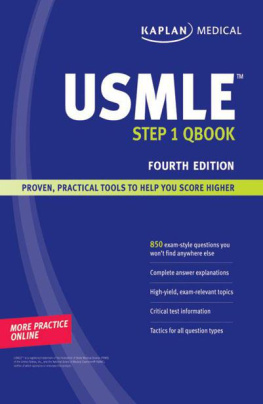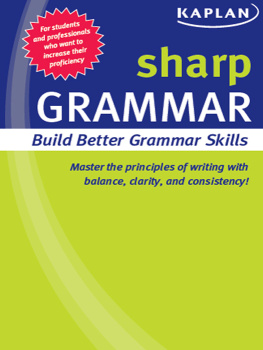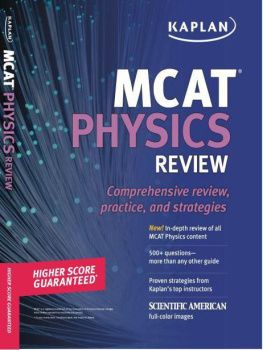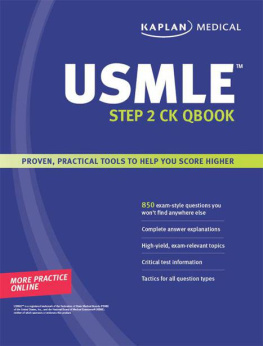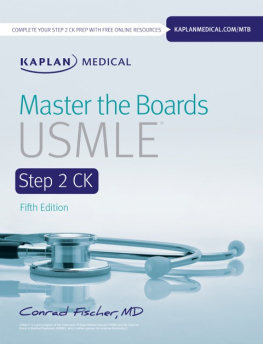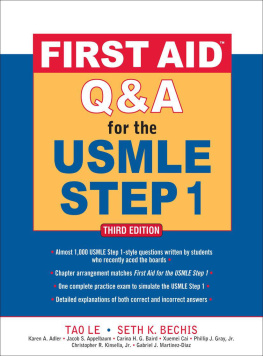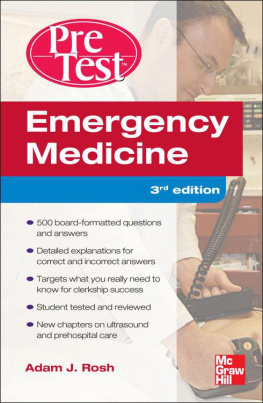USMLE is a joint program of the Federation of State Medical Boards of the United States, Inc. and the National Board of Medical Examiners.
Preparing for and doing well on the USMLE Step 1 are essential requirements on the road to becoming a practicing physician. The skills needed for preparation and execution on multiple-choice tests have little to do with the day-to-day practice of medicine but are necessary hurdles that you must overcome to advance in your medical career. Take heartthis task is not insurmountable; there have been many ahead of you. It only requires some knowledge of techniques, a little planning, a dash of impertinence, and above all, patience. This guidebook is intended to help you with this process.
The first chapter, titled Inside the USMLE Step 1 Exam, within the Test-Taking and Study Strategies Guide section was developed to help you gain a better understanding of the exam. It includes a thorough analysis of the question subtypes. In addition, it describes the overall purpose of the exam, as well as its structure and design, and offers crucial insights to help you do your best on test day.
The last four chapters of the Test-Taking and Study Strategies Guide section offer practical suggestions to help you make the most of your preparation time and avoid common pitfalls in the exam itself. These chapters summarize the key study and test strategies that have helped thousands of students achieve their maximum score. Use these strategies and approaches as you work through the tests in this Qbook. (We also offer advice on how to use the new FRED software interface.) Then be sure to reread the final chapters of this guide as your exam approaches to get great advice on what to do during the weeks leading up to the exam, as well as on test day itself.
The Qbook Practice Tests contain a total of 850 Step 1style questions divided into test blocks of 50 questions each. These blocks are designed to give you a sense of how the actual exam is constructed. Each test is followed by comprehensive explanations of both the correct and incorrect answer choices. We recommend that you wait until you complete your review of a subject area before taking an exam, that you take each exam in the allotted one-hour time frame, and that you do not look at the answers until you have completed an exam in its entirety. Following each test, review why each answer is correct and why each distractor is wrong. This will provide you with the information needed to answer other similar questions on the same topic. There are two exams in Anatomy, Behavioral Science, Biochemistry, Microbiology/Immunology, Pharmacology, and Physiology. Because of the increasingly clinical nature of the exam, we have included five tests covering Pathology and Pathophysiology. A list of standard lab values can be found on pp. 447448 for easy reference.
Best of luck on your Step 1 exam.
Kaplan Medical
Test-Taking and
Study Strategies Guide
ABOUT THE USMLE
The United States Medical Licensing Examination (USMLE) consists of three steps designed to assess a physicians ability to apply a broad spectrum of knowledge, concepts, and principles, and to evaluate the physicians basic patient-centered skills.
The three steps are:
Step 1 (multiple-choice exam)This exam is designed to test how well the examinee applies basic, integral science concepts to clinical scenarios.
Step 2 (two separate exams)The Step 2 Clinical Knowledge (CK) is a multiple-choice exam designed to determine whether the examinee possesses the medical knowledge and understanding of clinical science considered essential for the provision of patient care under supervision. The Step 2 Clinical Skills (CS) is a separate hands-on exam that tests the examinees clinical and communication skills through his/her ability to gather information from standardized patients, perform a physical examination, communicate the findings to the patient, and write a patient note.
Step 3 (multiple-choice exam)This exam assesses the examinees ability to apply medical knowledge and the understanding of biomedical and clinical science essential for the unsupervised practice of medicine, with emphasis on patient management in ambulatory settings.
DESCRIPTION OF THE STEP 1 EXAM
The USMLE Step 1 is an eight-hour, computerized examination that assesses whether you understand and can apply important concepts of the sciences basic to the practice of medicine, with special emphasis on principles and mechanisms underlying health, disease, and modes of therapy. Step 1 ensures you know the science within clinical contexts to safely and competently practice medicine under supervision.
Step 1 at a Glance
Test Type: Computer-based
Examination Length: Seven 60-minute blocks administered in one eight-hour testing session; each block has 50 questions; computer tutorial: 15 minutes; breaks: 45 minutes, self-scheduled
Number of Questions: Approximately 350
Question Type: Single best answer multiple-choice test items
Average Time per Question: Approximately 72 seconds
How Step 1 Is Different from Other Tests
The USMLE Step 1 is different and, in many ways, broader, more difficult, and more comprehensive than any exam you have ever taken in medical school. As such, it requires a different type of preparation than most medical school exams.
More time, effort, and money go into the creation of the USMLE exams than any other exam you have taken. Items on the exam are not just questions to be answered, but problems to be solved. Good USMLE questions test the students capacity to think about important medical knowledge and apply it in specific presented situations. The USMLE doesnt test mere recall of facts; it assesses students ability to use that knowledge in clinical situations. A good knowledge base is essential, but is not sufficient. Students must know how to use the information that they know.
HOW TO SUCCEED ON THE EXAM
You can do well on this exam, but doing your best requires forethought and preparation. This preparation must be on several levels.
First, you must be familiar with the types of questions you will face, as well as the overall structure of the exam itself.
Second, you must organize your study time efficiently to get the most out of it.
Third, you must know how to use the content being tested, not just recognize it. You must be able to apply it in hypothetical situations.
Fourth, you must physically and mentally prepare yourself for the task at hand.
In short, you must know the exam, master the material tested, and be prepared to handle yourself during this stressful time. In this chapter and the chapters ahead, well help you tackle these tasks.
Note
Familiarize yourself with the test tutorial on the USMLE website at usmle.org at home and save 15 minutes for breaktime on test day.

